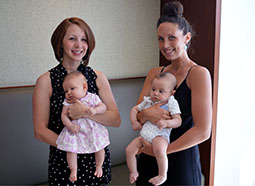Sisters-in-law strive to prevent premature labor, giving birth to healthy babies 11 days apart
August 18, 2017

Sisters-in-law Lydia and Katie Nadal have been pregnant at the same time, not just once or twice, but actually three times, giving birth to their youngest children this past March at Northwest Community Hospital (NCH).
“Having someone there that knew exactly how I felt, who was in the same position as me, was very comforting and gave me peace of mind,” recalls Lydia. “When I was worried about something, I’d tell Katie and she’d make me feel better because she could understand.”
Along with the support of each other, their husbands and families, Lydia and Katie credit their positive birth experiences to the physicians at Northwest Women’s Consultants, who listened to them and monitored their pregnancies very closely. They also thank the compassionate nurses and staff at NCH for making them feel comfortable.
Lydia’s story: Delaying premature labor
Lydia’s first two children were both born prematurely at another hospital. Each baby spent time in the Neonatal Intensive Care Unit (NICU), so Lydia fully expected the same thing to happen with her next two children. While pregnant with her third child, Lydia went with Katie on a hospital tour of NCH and was impressed with its Level III NICU, which provides the highest level of care for preemies and sick infants. Lydia’s previous NICU experience brings her memories of one room with tons of babies, no privacy and limited visiting hours. She didn’t know the private rooms and comfortable setting of the NICU at NCH even existed. Luckily though, Lydia’s third child, Luiza, was born at 37 weeks, her first nearly full-term pregnancy!
With her youngest and fourth child, Lydia spent a night in the hospital at 32 weeks for signs of premature labor. They weren’t sure if she would make it another week. At the hospital, she was given steroid injections. She followed up with Steven Kooperman, M.D., her obstetrician/gynecologist, with weekly progesterone shots to help prevent another premature birth. She was put on moderate bedrest, but still had three children to chase around at home.
“It is important to recognize the signs of premature labor, which includes uterine contractions and pelvic pressure, and to call your doctor right away so we can monitor the clinical situation and intervene as early as possible, if needed,” says Dr. Kooperman. He stresses that good communication between the patient and doctor is key and leads to the best possible outcomes for mom and baby. Dr. Kooperman explains, “In Lydia’s case, we were aware of her history of premature births, she stayed in close contact with us throughout the pregnancy and allowed us to use the latest technologies and protocols to delay labor.”
Every day she thought “today was the day,” but she kept lasting another day, and then another. “I was happy to get to 36 weeks, then I got to 37, and then 38. I did not expect to hold out until 39 weeks, my personal record!” exclaims Lydia. After weeks of anticipation, Lydia gave birth to a healthy, adorable baby boy. August was born on March 13, 2017, weighing 8 lbs. and 11 oz.
We asked Lydia…
NCH strives to create meaningful moments for new families. What was your NCH meaningful moment?
Lydia: Being able to hold my babies right after they were born. I hadn’t been able to do that with my previous births. We got to do skin-to-skin and spent our first nights together in a quiet room while we both recovered. NCH really valued our private time as a new family.
What advice do you have for new moms?
Lydia: After two premature births, I learned not to ignore anything. So, I guess, if I had to give one piece of advice to expectant mothers, it is this: Call that doctor in the middle of the night, make that appointment for that silly little feeling, ignore nothing and trust your gut. It could be the difference between 32 and 39 weeks.

Katie’s story: Closely monitoring an early pregnancy scare
“Bleeding is much more common than people think in early pregnancy; some studies have said that up to 40 percent of women experience bleeding,” says Dr. Springer. She encourages all women to call their physician if they have any bleeding to evaluate the cause or significance of the bleed and to rule out miscarriage concerns. Dr. Springer adds, “The most common cause of early pregnancy bleeding is not actually miscarriage, but instead implantation bleeding, cervical polyps, cervical ectropion, vaginal infection and inflammation, among other problems.” Dr. Springer says most cases will resolve without any intervention, but sometimes modifying activity or treating the underlying problem will help resolve the bleeding.Katie has given birth to all three of her daughters at NCH, and describes her first two pregnancies as “textbook,” without any complications. Her most recent pregnancy was her toughest, which started out with a bleed that kept getting larger and doctors feared she might lose the baby. Julie Springer, M.D., Katie’s obstetrician/gynecologist, kept a close eye on Katie and her baby through regular ultrasounds and exams, including a Level II ultrasound that provided a more detailed evaluation of the baby’s development. Dr. Springer reassured Katie that it wasn’t necessarily a cause for concern.
With time, Katie’s bleed started to shrink, eventually resolving entirely. She went on to have a healthy, beautiful baby girl. Molly was born on March 24, 2017, weighing 6 lbs., 15 oz., just 11 days after her cousin August.
We asked Katie…
NCH strives to create meaningful moments for new families. What was your NCH meaningful moment?
Katie: After hearing all the horror stories, including a bad experience Lydia had, my biggest fear going into labor every time was the epidural. I would build it up in my head that the worst could go wrong and cried my eyes out before everyone. However, the anesthesiologists and nurses were there for me and made me feel so comfortable, allowing me to cry on their shoulders. So despite my fears, I walked away with a positive experience each time.
What advice do you have for new moms?
Katie: Go on the hospital tour to better prepare yourself for what to expect and lean on the nurses because they are there to help you. Also, you probably packed way too much for the hospital.
Share your moments with us. #nchbabymoments
To learn more about maternity services at NCH or to register for prenatal classes and tours, visit nch.org/baby.
Download the NCH Baby App. Available on Apple and Android phones.
Five things pregnant women need to know about epidurals
Kevin Chen, M.D., Chief, Department of Anesthesia and Pain Medicine at Northwest Community Hospital, shares what you need to know about epidurals.